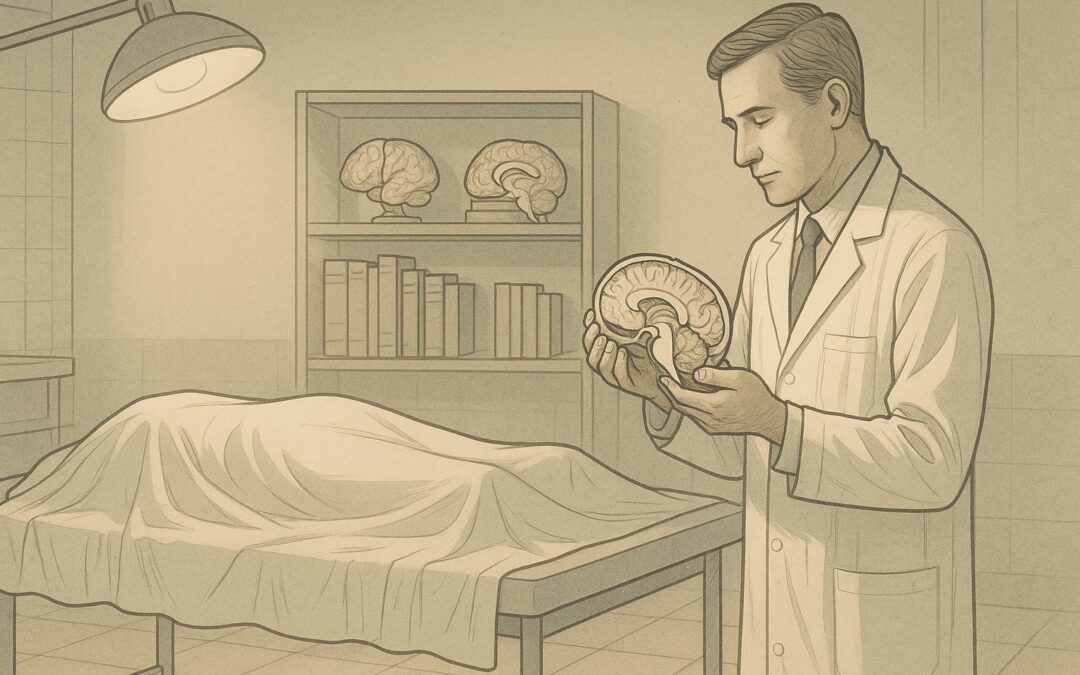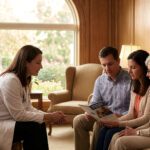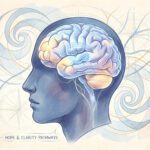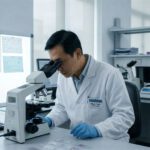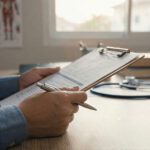Understanding the Process
A brain-only autopsy is a focused postmortem examination that concentrates solely on the brain. Unlike traditional full-body autopsies, it does not involve inspecting other internal organs. Instead, the entire process centers on understanding what occurred neurologically. Families and physicians use this service to identify, confirm, or explore neurological conditions such as Alzheimer’s disease, Parkinson’s disease, dementia, chronic traumatic encephalopathy (CTE), epilepsy, brain cancer, or traumatic brain injury.
At 1-800-AUTOPSY, every brain-only autopsy is conducted by Board Certified Neuropathologists. These professionals possess specialized expertise and are supported by trained autopsy technicians. The examination begins with an external assessment, including documentation of any visible head trauma or abnormalities. The brain is then carefully removed, preserved using standard fixation methods, and analyzed in a clinical laboratory under a microscope.
High-resolution photographs, tissue slices, and microscopic slides are created for full evaluation. Each detail is logged, categorized, and reviewed to ensure no information is missed. The findings often include evidence of plaques, tangles, hemorrhaging, inflammation, tumors, or brain shrinkage, all of which help clarify disease progression and severity.
Some families fear this process might disfigure the deceased or make open-casket funerals impossible. However, skilled technicians at 1-800-AUTOPSY perform every procedure with precision and care. The body remains suitable for viewing, and funeral arrangements proceed uninterrupted. The integrity and appearance of the deceased are preserved.
Autopsy Misconceptions
Numerous misconceptions cloud public understanding of autopsies, especially brain-only procedures. A common myth is that autopsies are exclusively for homicide or crime investigations. In reality, most autopsies are medical in nature. They serve to answer unresolved questions and validate diagnoses made during life.
Some families believe autopsies are unnecessary if a death certificate has been issued. Others fear that an autopsy implies distrust toward physicians or caregivers. In fact, many doctors support autopsies because they provide postmortem feedback on diagnostic accuracy. For neurological conditions, this feedback is especially critical.
Another myth suggests that brain autopsies offer no value after death. This is untrue. Conditions like Lewy body dementia, Huntington’s disease, or multiple system atrophy cannot be conclusively diagnosed without examining brain tissue. Often, symptoms overlap with other diseases. Only a postmortem analysis offers certainty.
There is also confusion about who can request a brain-only autopsy. Families often assume these procedures are restricted to county coroners or hospital systems. However, private services like 1-800-AUTOPSY allow legal next-of-kin to initiate a brain-only autopsy at any time. Located in La Crescenta, California, our facility offers a confidential, supportive environment for these procedures.
Ethical Considerations
Ethical concerns often arise when families consider brain autopsies. Religious practices, cultural traditions, and emotional sensitivities can shape how people view postmortem examinations. Some believe the act of dissection disrespects the deceased or disrupts the soul’s journey.
1-800-AUTOPSY honors these beliefs through patient-centered communication. Our staff explains the process in detail, provides written consent forms, and offers alternatives when appropriate. We ensure families understand their rights, the procedure’s scope, and the respectful manner in which it is carried out.
Our team is trained to be culturally competent and considerate. In cases where families are unsure about proceeding, we can arrange phone consultations with a medical professional to answer theological or ethical questions.
Data privacy is another concern. Many families worry that autopsy findings could become public or shared inappropriately. At 1-800-AUTOPSY, all results are handled according to strict HIPAA guidelines. Reports are only shared with designated recipients and remain stored securely for two years. Families can request additional copies or have them mailed to physicians, attorneys, or genetic counselors as needed.
Medical Value
The medical importance of a brain-only autopsy cannot be overstated. During life, doctors rely on tools such as MRIs, CT scans, and behavioral assessments to diagnose brain disorders. While helpful, these tools are not definitive. A brain autopsy provides histopathological proof—the only form of certainty.
Conditions like Alzheimer’s disease, CTE, or frontotemporal dementia may share identical symptoms. Misdiagnosis rates are high. According to the journal Brain, between 20% to 50% of Alzheimer’s cases identified during life are proven inaccurate postmortem. These errors affect treatment decisions, legal cases, and family health planning.
A brain-only autopsy allows pathologists to confirm or challenge previous medical conclusions. It also enables the identification of previously undiagnosed conditions that may have contributed to a loved one’s symptoms. In some cases, findings reveal completely unexpected causes of death, such as hidden tumors or viral encephalitis.
For surviving family members, this information has deep implications. Hereditary conditions uncovered in the brain tissue can help first-degree relatives pursue genetic testing, early screening, or lifestyle modifications. Informed healthcare decisions can extend life, prevent illness, and guide long-term care planning.
Legal and Insurance Relevance
Brain-only autopsies also influence legal, insurance, and occupational matters. In personal injury or wrongful death lawsuits, documented evidence of neurological injury can shift the outcome of the case. Neuropathological reports are often used to validate claims, refute malpractice accusations, or establish the timeline of disease onset.
For example, families affected by suspected medical negligence can use brain autopsy findings to prove or disprove clinical errors. Insurance carriers sometimes dispute claims related to neurodegeneration or cognitive decline. A brain-only autopsy presents undeniable facts.
At 1-800-AUTOPSY, our board-certified professionals provide not only pathology services but also expert witness support. They are available for depositions, trial testimony, and written affidavits. Our documentation process follows the chain-of-custody standards necessary for courtroom admissibility.
Autopsy reports generated by our team often include high-resolution imaging, histopathological diagrams, diagnostic terminology, and plain-language summaries. These documents help families, attorneys, and insurers evaluate cases fairly and efficiently.
Myths vs. Facts
- Myth: Autopsies disfigure the body.
Fact: Brain-only autopsies are performed with precision. The external appearance of the deceased remains suitable for viewing. - Myth: Only state or government agencies conduct autopsies.
Fact: Private autopsy services like 1-800-AUTOPSY offer licensed, confidential procedures directly to families. - Myth: Brain autopsies are for rare or exotic illnesses.
Fact: Common conditions like stroke, Alzheimer’s, and trauma often require postmortem confirmation. - Myth: A brain autopsy is pointless after death.
Fact: Postmortem exams answer unanswered questions, clarify symptoms, and assist in future planning. - Myth: Autopsies delay the funeral.
Fact: Procedures are typically completed within 24 hours and coordinated with funeral homes to avoid delays. - Myth: Religious beliefs prohibit all autopsies.
Fact: Many faiths permit autopsies when done respectfully and for just cause. Options for minimally invasive procedures are available.
Family Impact and Benefits
When Linda’s father died after years of progressive memory loss and confusion, the initial belief was Alzheimer’s disease. Despite clinical observations, no conclusive tests had confirmed this. Hoping to gain closure and provide answers for future generations, her family contacted 1-800-AUTOPSY for a brain-only postmortem examination.
The final pathology report revealed that Linda’s father had Lewy body dementia—a condition often confused with Alzheimer’s. This clarification brought relief to her family and allowed siblings and children to better understand potential risks. With this new information, Linda and her family scheduled genetic consultations and began proactive healthcare planning.
Stories like Linda’s are common. A thorough brain-only autopsy transforms grief into empowerment. Families no longer carry uncertainty about their loved one’s struggle. They receive answers, written explanations, and visual documentation that validate their experience.
The report includes microscopic slide analysis, photographs, findings summary, and conclusions written in medical and lay terms. It becomes a lasting resource for family records, physician education, and legal reference.
The 1-800-AUTOPSY Approach
1-800-AUTOPSY operates from a private, secure facility in La Crescenta, California. We are the nation’s longest-standing private autopsy service, trusted by families, attorneys, and medical professionals across the country. Our team is available 24/7 to answer questions, coordinate with funeral homes, and begin procedures without delay.
Each case is handled by licensed pathologists, neuropathologists, and trained autopsy technicians. We provide complimentary refrigeration, secure documentation, and personalized communication every step of the way.
Families receive preliminary findings by phone within 24 hours of the procedure. The complete report, including all microscopic and photographic evidence, is delivered within six to ten weeks. Digital copies can be shared with authorized parties upon request.
We also maintain long-term storage of tissue blocks, pathology records, and lab slides, giving families future access if needed. Our support continues long after the initial procedure, and we remain available for follow-up questions and documentation.
Final Thoughts
Brain-only autopsies are not morbid, controversial, or unnecessary. They are responsible, respectful tools that bring clarity where confusion once lived. For families struggling with uncertainty or unexplained neurological decline, this service can provide definitive answers and emotional closure.
At 1-800-AUTOPSY, our commitment is to dignity, accuracy, and compassion. We treat every case as if it were our own loved one. We believe the deceased deserve a voice, and the living deserve peace.
If you are considering a brain-only postmortem examination, contact 1-800-AUTOPSY today. Call toll-free at 1-800-288-6779 or email info@1800autopsy.com to speak with a compassionate coordinator.

